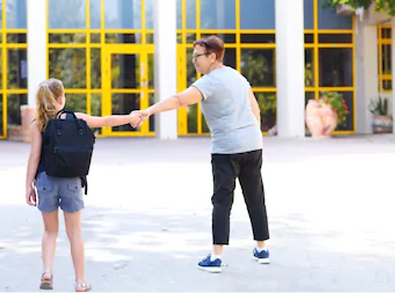SCHOOL PHOBIA (SCHOOL REFUSAL)
The number of children who dislike school and avoid it whenever possible is probably more than 5% of the school-age population, but less than 1% could genuinely be called 'school phobics'. School phobia, also called 'school refusal' is more common among boys, and the peak onset in Britain is at the age of 11-12 years. This is perhaps not surprising, since this is the age when most children move from primary to secondary school, and therefore experience great changes in their lives.
There are also smaller peaks at the age of 5-7 years old, where separation from the mother may be a primary cause; and at
age 14, where it is more likely to be associated with a psychiatric disorder such as Depression. Some older adolescents and young adults may experience fears of college or work that resemble school phobia; most of them have been school refusers when they were children.

Phobia or Truancy?
School phobia is sometimes confused with truancy - even by teachers and educational workers. However, truants do not usually express or display such high levels of anxiety, and nor do they flatly refuse to attend school. It is just that there are other things they would rather be doing. They are more likely to pretend to set off for school, and then disappear on the way, or during the day, returning home at the normal time, so that parents are often the last to find out what is happening. Truants also tend to become involved in other delinquent behaviour. They may also come from disadvantaged areas and homes where there is not enough discipline, caring, or simple parental interest. Their school work is likely to be rather poor and they will probably show little interest in what the school thinks of them.
This is in sharp contrast to the typical school refuser, who comes from a stable home with both parents present and caring (if sometimes over-protective) and who is often described as "always such a good boy/girl - never any trouble before this". Typical refusers may also be sensitive to the point of timidity, being unduly wounded by adverse comments from teachers, and have unrealistically high goals for themselves; they may then become excessively upset at their perceived failures.
Treatment of School Refusal
Although 'separation anxiety' (difficulty in leaving mother) can be a major factor in school refusal for 5 to 7 year-olds,
it is not necessarily significant for older children. 'Real' fears of such things as being bullied, PE and games, unfriendly teachers, the size of the school, and other personal and family difficulties, might be the dominant factors.
Children may also react to loss of friends through moving to a new school or area in the same way that they would to a bereavement.
-
Going to school for the first time
This is a normal type of school refusal. This develops with a child's normal separation anxiety, or uneasiness about leaving a parent figure. This type of fear usually goes away within a few days of the child attending school.
-
Fear
Older children may have school phobia based on a real fear of something that may happen to them at school, such as a bully or a teacher being mean. In this situation, it is important to talk with your child to determine what is causing his or her fears.
-
Distress
The final type of school phobia is seen in children who are truly distressed about leaving their parent and going to school. Usually, these children enjoy school but are too anxious about leaving their parents to attend.
Symptoms of School Refusal?
While every child is different, the following are some of the behaviours that may be present in your child:
-
The child may complain of physical symptoms (such as a stomachache or headache) that get better as soon as the child is allowed to stay home.
-
The child may tell you that he or she is anxious or afraid of a certain situation that happens at school.
-
The child may not want to leave the parent because of a change in the life of the child, such as a new school, sick brother / sister or parent, new brother or sister, changes in the family such as divorce or death.
What is School Refusal?
School refusal, or school phobia, is a term used to describe the anxiety symptoms a school-aged child has and his or her refusal to go to school. School phobia can be seen in different types of situations, including:

Treatment of School Refusal?
Every child is unique, each situation will be handled on an individually designed therapeutic program involving the parents and the school aiming to return the child to school instantly, combined with child and family counselling.
Cambridge Medical Centre (CMC) Child & Adolescent Mental Health information publications Copyright 2018.

